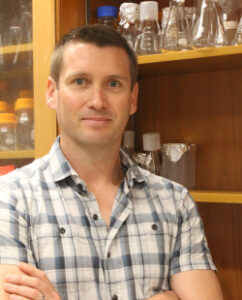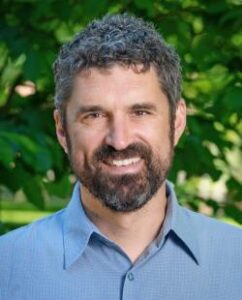July 03, 2025
ELPC Strengthens Board of Directors & Science Advisory Council
ELPC continues to build out a strong team of support
By Howard A. Learner, Chief Executive Officer & Executive Director
ELPC is adding to the strength of both our Board of Directors with new director Michelle Saddler and ELPC’s Science Advisory Council with Professors Greg Dick, Drew Gronewold and Trina McMahon joining as new science advisors in Spring 2025. ELPC’s Science Advisory Council engagement of top-rate scientists greatly benefits ELPC’s effective science-based legal and policy advocacy in the Midwest. Here’s the overall picture.
Board of Directors Addition
 Michelle Saddler is joining ELPC’s Board on July 1, 2025. Michelle is Managing Director and Principal at Kittleman & Associates, working to identify and elevate emerging leaders through executive search and other consulting services for nonprofit clients—with an emphasis on human service organizations and foundations. Before joining Kittleman & Associates, Michelle served as Secretary of the Illinois Department of Human Services (IDHS) and Chief of Staff to former Illinois Governor Pat Quinn. She has served on the Boards of Directors for the Michael Reese Health Trust, Housing Opportunities for Women, and the Center for Law and Social Policy. She was the first female recipient of the Distinguished Service to the Community Award by The Princeton Club of Chicago. Michelle earned her undergraduate degree from the Princeton University School of Public and International Affairs and her Masters in Management from Northwestern’s Kellogg Graduate School of Management.
Michelle Saddler is joining ELPC’s Board on July 1, 2025. Michelle is Managing Director and Principal at Kittleman & Associates, working to identify and elevate emerging leaders through executive search and other consulting services for nonprofit clients—with an emphasis on human service organizations and foundations. Before joining Kittleman & Associates, Michelle served as Secretary of the Illinois Department of Human Services (IDHS) and Chief of Staff to former Illinois Governor Pat Quinn. She has served on the Boards of Directors for the Michael Reese Health Trust, Housing Opportunities for Women, and the Center for Law and Social Policy. She was the first female recipient of the Distinguished Service to the Community Award by The Princeton Club of Chicago. Michelle earned her undergraduate degree from the Princeton University School of Public and International Affairs and her Masters in Management from Northwestern’s Kellogg Graduate School of Management.
Science Advisory Council Additions
 Gregory Dick is the Director of the Cooperative Institute of Great Lakes Research (CIGLR) and an Alfred F. Thurnau Professor in the School for Environment and Sustainability and the Department of Earth and Environmental Sciences at the University of Michigan, Ann Arbor. He has affiliations in the Department of Ecology and Evolutionary Biology, the Center for Computational Medicine and Bioinformatics, and the Chemical Biology Graduate Program. Professor Dick’s research focuses on the role of microorganisms in shaping environmental processes, water quality, and biogeochemistry. His lab specializes in the use of ‘omics (genomics, transcriptomics, etc.) to study microbial communities in a wide variety of environments including the deep sea, the Great Lakes, the human gut, and engineered systems. His current research focuses on the microbial ecology of harmful cyanobacterial blooms that threaten freshwater ecosystems around the world, using Lake Erie as a natural laboratory.
Gregory Dick is the Director of the Cooperative Institute of Great Lakes Research (CIGLR) and an Alfred F. Thurnau Professor in the School for Environment and Sustainability and the Department of Earth and Environmental Sciences at the University of Michigan, Ann Arbor. He has affiliations in the Department of Ecology and Evolutionary Biology, the Center for Computational Medicine and Bioinformatics, and the Chemical Biology Graduate Program. Professor Dick’s research focuses on the role of microorganisms in shaping environmental processes, water quality, and biogeochemistry. His lab specializes in the use of ‘omics (genomics, transcriptomics, etc.) to study microbial communities in a wide variety of environments including the deep sea, the Great Lakes, the human gut, and engineered systems. His current research focuses on the microbial ecology of harmful cyanobacterial blooms that threaten freshwater ecosystems around the world, using Lake Erie as a natural laboratory.
 Drew Gronewold is an Associate Professor at the School for Environment and Sustainability (SEAS) at the University of Michigan, and he is the lead Principal Investigator for the US on the NSF-funded Global Center for Understanding Climate Change Impacts on Transboundary Waters. He conducts research through a range of hydrological science projects that explore methods for quantifying and communicating uncertainties arising within long-term hydrological monitoring networks and data, and incorporating those uncertainties into models and risk-based water resources management decisions. Much of his recent research has focused on monitoring, analyzing, and forecasting the long-term water budget and water levels of the Laurentian Great Lakes. Professor Gronewold hold adjunct appointments in the U-M Department of Civil and Environmental Engineering and the Department of Earth and Environmental Sciences. Prior to his appointment in SEAS, he worked in the NOAA Great Lakes Environmental Research Laboratory as a hydrologist and physical scientist.
Drew Gronewold is an Associate Professor at the School for Environment and Sustainability (SEAS) at the University of Michigan, and he is the lead Principal Investigator for the US on the NSF-funded Global Center for Understanding Climate Change Impacts on Transboundary Waters. He conducts research through a range of hydrological science projects that explore methods for quantifying and communicating uncertainties arising within long-term hydrological monitoring networks and data, and incorporating those uncertainties into models and risk-based water resources management decisions. Much of his recent research has focused on monitoring, analyzing, and forecasting the long-term water budget and water levels of the Laurentian Great Lakes. Professor Gronewold hold adjunct appointments in the U-M Department of Civil and Environmental Engineering and the Department of Earth and Environmental Sciences. Prior to his appointment in SEAS, he worked in the NOAA Great Lakes Environmental Research Laboratory as a hydrologist and physical scientist.
 Trina McMahon is a Professor of Civil and Environmental Engineering, and Bacteriology, at the University of Wisconsin, Madison. Professor McMahon studies the microbial ecology of both natural and engineered systems using molecular tools to investigate microbial community structure and function in lakes and activated sludge. She also uses high-frequency environmental sensor networks to measure important variables that we know influence bacterial communities and is particularly interested in phosphorus, nitrogen, and carbon cycling in lakes and how this relates to eutrophication and water quality. Professor McMahon and her team use highly resolved time series sampling of multiple lakes, combined with metagenomics and meta-trascriptomics to explore how different lineages of freshwater bacteria contribute to this cycling.
Trina McMahon is a Professor of Civil and Environmental Engineering, and Bacteriology, at the University of Wisconsin, Madison. Professor McMahon studies the microbial ecology of both natural and engineered systems using molecular tools to investigate microbial community structure and function in lakes and activated sludge. She also uses high-frequency environmental sensor networks to measure important variables that we know influence bacterial communities and is particularly interested in phosphorus, nitrogen, and carbon cycling in lakes and how this relates to eutrophication and water quality. Professor McMahon and her team use highly resolved time series sampling of multiple lakes, combined with metagenomics and meta-trascriptomics to explore how different lineages of freshwater bacteria contribute to this cycling.

